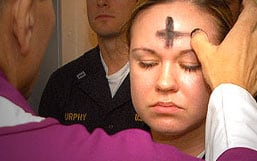

Babcia’s Polish Easter
By Robert Strybel, Polish/Polonian Lifestyles Writer
‘I beat you not, the willows do,’ said our forebears on that day.
‘The Great Day, the Great Night is but a week away.’
They said that on Palm Sunday while on their way to Mass,
The boys would soundly thrash the legs of any passing lass.
In Poland the solemn and humorous, the common and sublime
Were often all rolled into one in that bygone time.
They called it Floral Sunday, for unlike in the West
It wasn’t palms but flowers and willows that were blessed.
We carried them in procession – true sight to behold:
Beribboned rods of greenery flecked with red and gold.
While Lent would still continue – a time to pray and fast,
It all would soon be over after six more days had passed.
Bitter Laments and Stations for the very last time this year
And stern Good Friday worship again was drawing near.
Despite the somber spirit and penitential gloom,
Relief and joy and levity would soon begin to loom.
An effigy of Judas was beaten, burnt or drowned
And rye gruel and salt-herring bones were dumped upon the ground.
Pigs were butchered, cakes were baked and everything was scrubbed clean.
Rich and filling Easter fare would replace the Lenten lean.
We’d dip our eggs in dyes of onion skin and birch,
And the lads would help us carry our Easter food to church.
The Holy Saturday ritual was beloved by churl and squire:
The blessing of food and holy water and Easter’s first new fire.
Then we would go to Jesus’ tomb to meditate and pray
And then head home to get prepared for the glorious day.
We rose at dawn on Easter morn and donned our best attire,
And marched to church as day’s first rays glistened on its spire.
A procession formed outside the church and encircled it three times.
The incense mingled with the hymns and joyous church-bell chimes.
‘Wesoły nam dzień dziś nastał’ we sang as we processed,
Happy that Christ has risen and hoping to be blessed.
The church now blazed with candles and people filled the aisles.
To be at Rezurekcja some had walked for miles.
Cleansed in soul and body, we’d sing, give thanks and pray
That a year from now we’d once again be there on Easter Day.
When Mass was o’er we’d chat with friends and finally home we went
To enjoy the tasty hallowfare after six long weeks of Lent.
We’d first say grace and share blessed eggs to set the festive mood
And then sit down to a fine array of long-awaited food.
First came the rye-meal żurek, a tart and tangy pottage
With eggs and sausage and a savory scent the filled the entire cottage.
There were hard-boiled eggs aplenty and every type of meat:
Ham, kiełbasa, galareta and many another treat.
The horseradish made eyes water, but all would weep and sup
Or choose the milder ćwikła that our Babcia had whipped up.
There were jellied knuckles and pork pâté to mention but a few,
Pickled mushrooms, spicy plums and boiled bacon too.
We all ate with great gusto; the men raised many a toast
To the health of all those present to the hostess and the host.
The day was filled with jollity and recollections of the past,
And the many life experiences the family had amassed.
The grown-ups stayed at table where they’d chat, raise toasts and munch,
But we youngsters would go out to play after eating Easter brunch.
Easter eggs we’d placed atop a slightly inclined board.
The one that rolled the farthest enriched the winner’s hoard.
Eggs were also tapped together until one finally cracked.
The winner was the youngster whose egg’d survived intact.
When in our teens we’d go for strolls down a country lane
And we girls would giggle, stare and blush at what the lads were saying’.

Luscious cakes and Easter breads were waiting to be tried.
The stately, golden babas stood tall and glazed in white,
The serniks and mazureks were such a tempting sight.
When none could eat another thing, fearing we might burst,
We’d ask for tea or compote with which to quench our thirst.
The feast resumed on Monday – more joy and celebration.
With Holy Mass and festive food and social visitation.
But on that day soon after dawn the lads were on the prowl. They’d drench us girls from head to toe and tease and laugh and howl. And Dyngus revelers would soon appear to make their yearly rounds, their songs and antics filled the air with playful, merry sounds.
All this my Babcia told me as I sat there by her side. A tear flowed down her weathered cheek that she tried hard to hide. She loved her native Poland so, which she never again would see, so she shared her childhood memories with a little tyke like me.
It’s been many years now since our Babcia passed away,
But I still recall the tales she told – as if it were yesterday.
Today my brow is furrowed, my hair is mostly gray,
When my grandkids come for Easter, this is what I say:
‘I beat you not, the willows do,’ said our forebears on that day.
‘The Great Day, the Great Night is but a week away.…’







